Fighter jets are scrambling, tanks are rumbling, naval destroyer ships are entering dangerous territories, sanctions – diplomatic and economic – are flying, and leaders around the world are exchanging heated rhetoric. What in the world is happening in Ukraine? Here is a discussion with a perspective that is sadly missing in the mainstream media.
Q. In a nutshell, what is happening in Ukraine?
A. There were huge protests in Kiev (the capital of Ukraine) for a couple of months, and about two weeks ago, the president of Ukraine – who is pro-Russian – fled the country. A new, pro-western government has taken over Ukraine, rekindling some of the cold war tensions between Russia and the United States/European Union alliance. Specifically, Russia has sent troops to Crimea – a Ukrainian peninsula in Black Sea – and this action is being viewed by the other side as an invasion of Ukraine. Crimea is also trying to leave Ukraine and join Russia, and this is unacceptable to Ukraine and the U.S./E.U. countries which have responded quite strongly in words and actions.
Q. Every mainstream media, from the New York Times to the Wall Street Journal, seems to agree that Putin is wrong. Some leaders, including Hillary Clinton, have compared him to Hitler. So why shouldn’t we try to stop his aggression?
A. Emotions are running high, for sure. However, let’s not get carried away with the Hitler comparison. From the Vietnam War to the Iraq Wars (I and II) to the Syrian conflict, American politicians and the corporate media have compared numerous adversaries to Hitler. It’s an emotional button that people push to make their point. Putin is not trying to take over the world or even the former U.S.S.R. countries, including Ukraine. Remember when Margaret Thatcher invaded the tiny Falkland Islands that are 8000 miles away from the shores of England? She was praised as the “Iron Lady” for her courage and determination. There is some inevitable bias in the media.

Q. However, trying to take over Crimea is essentially taking over at least part of Ukraine, right?
A. You mean, the “Autonomous Republic of Crimea”?
Q. That sounds like a separate country. Isn’t Crimea just a province of Ukraine, like California is a state of the U.S.?
A. Not quite. Crimea became a part of Russia in 1783 during the reign of Catherine the Great, before California became a part of the U.S. or George Washington became the first President of the U.S. Crimea belonged to Russia all the way until 1954 – except for twenty years in the 19th century – when it was given as a gift to Ukraine by the Russian leader Nikita Khrushchev.
Q. Two questions: What happened in those twenty years and why did Khrushchev give Crimea to Ukraine?
A. In the mid 19th century, the British and the French joined the Ottoman Empire and attacked Russia in what came to be known as the Crimean War. It was purely a cold, pre-emptive geopolitical maneuver to maintain the influence of the British and the French Empires in the Mediterranean. 200,000 Russians died in the war. Russia won it back after twenty years.
Black Sea, where Crimea is located, is the only warm water body that Russia has access to, and hence is strategically important to Russia. Black Sea leads to the Mediterranean Sea which is the gateway to Europe, the Middle East and Africa. The significance of Crimea for Russia in the matters of trade and national security cannot be overstated.
As for Crimea being gifted to Ukraine, three facts played key roles. One, Russian Premier Khrushchev was of Ukrainian heritage and lived in Ukraine for the first thirty years of his life. He became the leader of the Ukrainian Communist Party before moving to Moscow. Obviously, he had special affections for Ukraine. Second, 1954 marked the 300th anniversary of Ukraine being a part of Russia. Third, the 1950s were the heydays of the U.S.S.R. and nobody in Russia could imagine Soviet Union breaking apart or Ukraine becoming an independent nation.
Q. So the history of Russia-Ukraine relationship runs for about 400 years?
A. Actually, it’s more like 1200 years! The first big Slavic nation was “Kievan Rus” that was established in the 9th century, with Kiev as its capital. In some sense, Ukraine is the motherland of Russia!
Q. How autonomous is Crimea?
A. After the fall of the Soviet Union, Crimea acquired a more autonomous role with its own parliament and constitution. So it is definitely not just another province in Ukraine. It also has a Russian naval base –in Sevastopol – which Russia officially leases from Ukraine (the lease is valid until 2042). Russia also has the right to have up to 25,000 troops in Sevastopol. Thus, what is called a “Russian invasion” in the mainstream media is misleading.
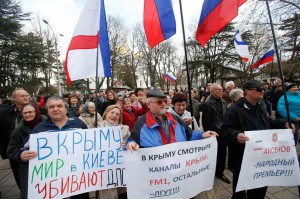
Q. Are the people in Crimea okay with the Russian presence?
A. 60% of Crimeans are ethnic Russians. A couple of days ago, the Crimean parliament voted unanimously in favor of joining Russia. They are going to hold a referendum next week. Most likely, the people will also agree with the parliament. However, the new Ukrainian leaders and Obama have said that this goes against the international law and that the Crimeans don’t have the right to secede. There are some minorities in Crimea, such as the Tatars, who would rather be with Ukraine.
Q. On one hand, it seems to be a democratic principle to allow people to determine their future. On the other hand, wouldn’t it lead to chaos if we let people secede in various nations?
A. True, these are not matters with simple answers. However, we have supported secessions when it enhanced our national interests. The west obviously supported and helped all the nations who wanted to secede from the U.S.S.R. The U.S. helped split Sudan and created South Sudan just three years ago; it also supported the creation of Kosovo, a breakaway region of Serbia which happens to have closer ties with Russia. In Iraq, the neocons even supported splitting Iraq into Sunni, Shiite and Kurdish countries. Of course, if you go back in history, almost every country in Africa and the Middle East derived their borders from the imperial nations’ calculated actions based on natural resources and military strategies.
Q. On that note, does Ukraine offer any such economic advantages to Russia?
A. Yes, and those economic facts play a significant role. First, Russia’s major export to the E.U. is natural gas, worth tens of billions of dollars every year. About two-thirds of this natural gas flows through Ukraine. You should also consider all the investments that Russia has made in these pipelines and in Ukraine, in general. To maintain close relationships with Ukraine, Russia also has given them huge loans and significant discounts in natural gas which is used by various industries as well as the Ukrainian public in their homes.
As for the European Union, they get about 30% of their natural gas from Russia, and for countries like Germany, the number is even higher. This is one reason that the European countries are reluctant to antagonize Russia too much.
Ukraine is also known as the “breadbasket of Europe” having been blessed with rich, fertile soil. Ukraine is the fifth largest exporter of wheat in the world and the third biggest exporter of corn. Ukraine also has vast amounts of shale oil and natural gas which have not been exploited so far.
Q. What would be the economic benefits for the U.S. and E.U. in having Ukraine lean towards them?
A. If Ukraine joins the E.U., it will be the largest country there, even bigger than France, Germany or Spain. There are many oil companies that are salivating over the shale gas/oil in Ukraine. Chevron just signed a 50-year, $10 billion deal with Ukraine last November to extract natural gas by fracking. Shell has signed similar deals. But most importantly, Exxon was hoping to sign an offshore drilling deal with Ukraine in Black Sea which would be almost impossible without using Crimea as a path for the pipelines.
Also, biotech companies such as Monsanto, Syngenta and Dow would love to take over the Ukrainian land and crops – especially their staple corn and wheat – with GMOs.
Q. So it really boils down to oil, GMOs and natural resources? What about all the talk about spreading democracy?
A. If you consider Saudi Arabia, one of our closest allies, it is an undemocratic country – run by a puppet family – where women cannot vote or even drive. The not-so-pretty fact is that the U.S. government has supported many dictators and undemocratic countries whenever it was beneficial. Many other democratically elected leaders have been assassinated or thrown out of the office by orchestrated coups. We tend to live in what the psychologists call as “willful ignorance.” A really good book to learn about this dark side of the foreign policy is “Confessions of an Economic Hit Man” by John Perkins. On the other hand, this is how empires have usually behaved throughout history.
Democracy is just a code name for free market. “Spreading democracy” is a politically correct term for breaking down the door for free market.
Q. That sounds awful, but isn’t free market good for Ukraine or any other country?
A. Ukraine getting into an unrestrained free-market deal with the U.S. is akin to a 10-year-old getting into a boxing ring with Mohammed Ali. Think about it, Citibank can walk into Ukraine and buy all their banks by writing a single check. What Ukraine can offer are cheap labor and plenty of natural resources, both of which will be exploited, leaving them only poorer in the long run.
Q. Nevertheless, the Ukrainian people started the revolution, right? It’s not like we attacked the country to spread freedom like we did in Iraq.
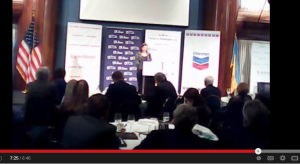 A. Almost, yes. If you watch the video where the Assistant Secretary of State, Victoria Nuland, gave a speech – incidentally with a big Chevron sign on the side! – she admits that the U.S. has spent over $5 billion (after 7 min 25 sec in the video) to “help” the pro-western parties. There was also a leaked phone call where she can be heard deciding who will lead the new government in Ukraine. We certainly would not appreciate it if Russia or China spent billions of dollars spreading anti-American movements in Mexico or Canada.
A. Almost, yes. If you watch the video where the Assistant Secretary of State, Victoria Nuland, gave a speech – incidentally with a big Chevron sign on the side! – she admits that the U.S. has spent over $5 billion (after 7 min 25 sec in the video) to “help” the pro-western parties. There was also a leaked phone call where she can be heard deciding who will lead the new government in Ukraine. We certainly would not appreciate it if Russia or China spent billions of dollars spreading anti-American movements in Mexico or Canada.
Plus, what happened here was not a free election where the pro-Russian government lost. It was a few thousand people protesting in the capital leading to the ouster of a democratically elected president. Technically, it was a coup. Would we allow protestors to kick our president out of the White House? This sets a bad example for anarchy winning over democracy.
Q. John Kerry and others keep saying the protests were peaceful. There was even a viral video with a Ukrainian woman talking about dictatorship and the peaceful protests.
A. The protests were mostly peaceful, but not always. There were times when firebombs (Molotov cocktails) and guns were used by the protest movement. It is now believed that someone from the opposition movement hired snipers to create false-flag attacks. There is an element of the protest movement, the fascist/neo-Nazis, that the mainstream media and the western politicians have ignored so far since it served their purposes and the narrative of a peaceful revolution. Even in the new government, the alliance of the far-right parties – Svoboda – holds many significant posts including that of Deputy Prime Minister. The leader of this party, Dmytro Yarosh, has said he will run for Ukraine presidency as well.
As for the viral video, it was produced by a well-funded group in the U.S. with people like Larry Diamond who is active in effecting “regime changes” around the world including Iran and Venezuela. National Endowment for Democracy (NED) is a taxpayer-funded neocon organization that has many active projects around the world.
In general, the protests were a bit analogous to the Tea Party movement which had Koch brothers behind it.
Q. Weren’t there protests all over Ukraine?
Ukraine is almost divided in half, in terms of demographics. The eastern half has many more people of ethnic Russian origin and tends to be pro-Russian. In the last few days, there have been many protests in the eastern cities where people have raised Russian flags on government buildings. Of course, the new Ukrainian government and the western media don’t view the pro-Russian protestors kindly. Crimea, with about 60% ethnic Russians, is eager to endorse the referendum to join Russia.
Q. Even with all that, if we assume that the end will justify the means, wouldn’t Ukraine be better off aligned with Europe than Russia?
A. Many Ukrainians hope that they can emulate other ex-communist nations like Poland or Czech Republic. Ukraine is still relatively a poor country with a GDP per capita of about $6000 a year – a third of Poland’s and about a fourth of Czech Republic’s figures. In the best case scenario, Ukraine can grow its economy as well.
In the worst case scenario, Ukraine can end up like Greece – a nation ruthlessly exploited by the international banks and corporations. Imagine Chevron and Shell fracking their way across the beautiful rural lands of Ukraine while Monsanto sows the seeds of GMOs, destroying the ecosystem and the livelihoods of farmers.
In exchange for their loans, the E.U. banks would demand harsh austerity programs which basically translate to huge layoffs in the public sector, followed by cuts in social security, health care and every government program you can think of. Of course, this will be followed by privatization of the economy which is just a euphemistic term for selling national assets to oligarchs and corporations at bargain prices. The worse the economy, the better it is for foreign banks and corporations since they get the upper hand in negotiations. By the way, this is a standard play book that has been used by the IMF, EIB and the World Bank for more than 50 years all around the world.
The new leaders of Ukraine don’t exactly represent the senior citizens of Ukraine who get about $160 a month in social security. The new prime minister is a millionaire ex-banker, and the two new governors of large provinces are billionaires. Ironically, the new interim government was put in place without an election. If history is any guide, this new government will be a symbol of crony capitalism.
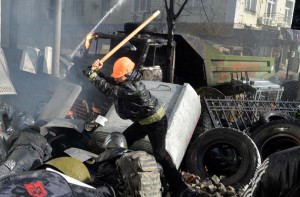
Q. Will Russia attack Ukraine? Will Ukraine or the U.S./E.U alliance attack Crimea? Is this the beginning of something horrible?
A. If cool heads prevail, disastrous results can be averted. Russia cannot afford to lose Crimea. The U.S. and the E.U. have gained the rest of Ukraine, and they should be happy with that. Russia’s military budget is less than one-fifth of the U.S., so there is no need for alarm or overreaction.
As for Ukraine, it cannot afford to break ties with Russia that has been like a family for over 1000 years. Ukraine needs to avert a civil war that can happen if ethnic Russians in the wealthier eastern Ukraine feel threatened or oppressed by a nationalist government. Ukraine needs to respect minority rights and keep the far-right fascist parties in check.
Ukrainians will soon realize that life in the E.U. is not going to be an easy ride. There might be buyer’s remorse in the near future.
The best course for Ukraine would be to maintain friendships on both sides of the aisle. Don’t antagonize Russia and the ethnic Russians within the border, integrate slowly with the European Union, avoid joining the NATO, and don’t let any western military bases within the borders. After the fall of the Soviet Union, the west reneged on its promises and added many former communist countries to NATO. Russia already feels claustrophobic, surrounded by so many NATO and U.S. military bases.
Q. Final question: many people feel unpatriotic to question the government during a foreign crisis. What can be done about that?
A. Guess how many people died in World War II? 60 million! That’s 9/11 happening every single day for 54 years. This monstrosity happened because, in every country, people blindly supported their leaders in foreign policy decisions. Patriotism does not mean supporting meaningless slogans, but rather demanding that the elites in charge of representing us make good, moral decisions that bring peace and prosperity. Everyone speaks against the Iraq war now, but where were they twelve years ago? The time to analyze, question, debate and educate ourselves is now, and not after the missiles have been fired.
Chris Kanthan is the US investigative journalist living in San-Fransisco. He has degrees in Physics and Engineering with a minor in Economics. He is the author of “Deconstructing Monsanto“.
Source: Nation of Change
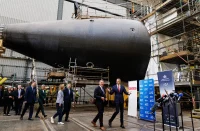
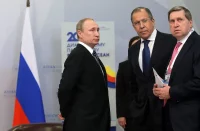
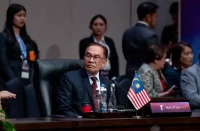











Pingback: The Referendum in Crimea… | YERELCE
Pingback: Washington sanctioning Democracy and hailing Nazism | Oriental Review
Pingback: A Warning on Nationalism | The Soul of the East
Pingback: A Warning On Nationalism – Radix Journal